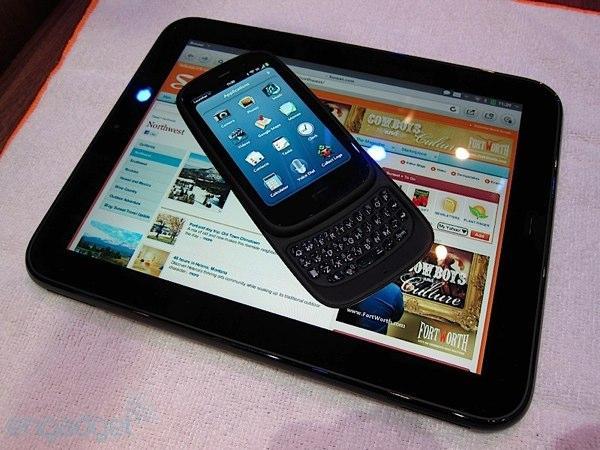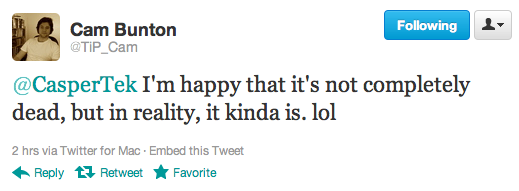
The fate of HP's webOS, which was acquired during the Palm buyout in April of 2010, has been up in the air since HP hit some turbulence in mid-August. From way out in left field, HP announced plans to spin off PSG and pull out of the webOS hardware making business, leaving the possibility of the then-unreleased Pre 3 and the future of the newly released HP TouchPad up in the air. Abruptly, HP announced a fire sale to get rid of any straggling hardware and to quickly put the Pre 3 to death.
Since then, however, Leo Apotheker has been relieved of his duties and has been replaced by Meg Whitman, former President and CEO of eBay. Whitman reversed many of Apotheker's hasty plans, like spinning off PSG, and put the future of webOS up for debate. We have heard plans of licensing or even selling the software to another company, but we weren't truly sure which way it would go. Earlier today, HP had an all-hands meeting to decide the fate of webOS once and for all.
The verdict? HP has decided to open source webOS. As our own Alex Wagner explained earlier:
"HP said that it plans to continue to develop and support webOS but that it will also make the underlying code available to anyone under an open source license. The company will also be making Enyo, webOS's application framework, available to users 'in the near future.' HP makes no mention of any plans to produce new hardware in its announcement, but it does point out that other hardware manufacturers are free to tinker with and enhance the OS and that the decision to open source brings the opportunity to improve apps and services 'for the next generation of devices.'"

Great. Now what? In order for this to even mean much of anything, as Cam Bunton suggests above, hardware makers have to be on board. But who? Who would possibly want webOS after all it has been through? It's practically taboo, especially to all of the wireless providers in the States and UK. No webOS device has managed an impressive sales day in comparison to their Android and iOS counterparts. If by the off chance a manufacturer does decide to use it, webOS could actually survive this third chance. But I'm not holding my breath.
Originally, when we had heard webOS might be sold or licensed, prior to Whitman steering the ship, I made some speculations as to who would be a great candidate to fit their devices with webOS. Motorola, Samsung, HTC and LG were among the few possible. But things have obviously changed in the last five months.
Months ago, we learned that Motorola was considering creating their own web-based mobile platform. They were getting sued left and right by Microsoft and Apple, and Google was doing little to protect their partners who were neck deep in legal battles ... over Google's software. At the midpoint of August, however, Google announced that they plan to buy Motorola Mobility for both hardware and a larger patent portfolio.
Samsung has also come forward to say they were in the market for yet another mobile platform, but they were not going to jump into anything without serious thought first. Many – even I – suggested that webOS would be the perfect candidate for Sammy. The clean, rounded corners of the interface and sleek and powerful devices of Samsung would be a match made in heaven. However, Samsung did say they were not interested in buying webOS. And a licensing deal was withing the realm of possibility until Sammy paired up with Intel for Project Tizen, an open source project which is building off of the late MeeGo platform.
Out of the major manufacturers in the US, there are only a few left, like HTC, LG and Sony Ericsson who might consider using and developing webOS. We don't know if SE or LG are in the market for their own mobile platform or not, but we know HTC is. That said, I love HTC and I love webOS, but they simply would not make a nice pair. HTC's main goal would to nest Sense UI as deeply into the software as possible, and in truth, that's the last thing webOS needs. Then again, people love their Sense UI, and it may be the only hope webOS has left.
Personally, I wouldn't care to see LG take to webOS either. I'm not particularly a fan of anything LG has ever done in the mobile space. The webOS platform deserves a fighting chance and I don't think LG will be the one to deliver that. Then there is Sony Ericsson, who plans to split in 2012. Sony will undoubtedly be looking for a differentiating factor, and webOS could be the ticket. Again, not holding my breath.
Lest we forget, ZTE is also said to be making a grand appearance in the States in 2012 with a high-end handset of their own. I have no doubt that handset will be powered by Android. But ZTE is looking to make the US market their biggest market for handsets. Making that happen with Android will only prove to be extremely difficult and a very steep mountain to climb. While webOS might not be any easier, coming forth with two different platforms could stir things up for them a bit and help differentiate.
If you were to ask me which OEM I would want to see take webOS under their wing, I would have a terrible time answering. The important thing to consider is that with licensing, much like with Android, HP will not be limited to one manufacturer running with their software. Anyone under an open source license can manipulate webOS and put it on their devices. To be honest, I would like to see several OEMs take on webOS: HTC (half-hearted), Samsung (unlikely) and Sony Ericsson (also unlikely).
Open sourcing was a risky yet noble bet on HP's part. Instead of simply selling it off and making their money while they can, they're giving a twice-dead platform another chance. That's very commendable. So tell me, which manufacturer would you like to see pick up webOS (regardless of the likeliness)? Answer in the poll and give us your thoughts about webOS going open source below!
Image via Engadget